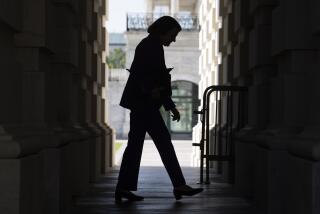Terrorism Safeguard Urged for House
- Share via
WASHINGTON — The nightmare scenario of a terrorist attack that could destroy the Capitol prompted calls Wednesday for a constitutional amendment to permit temporary appointments to the House of Representatives.
In emergencies, Senate seats can be filled quickly. The Constitution allows governors to appoint new senators.
But the House of Representatives, designed to be the “people’s house,” is different. Elections are mandatory.
“When vacancies happen” in the House, a governor “shall issue writs of election” to fill the seats, the Constitution says.
These special elections to fill a vacant House seat are a familiar feature of American politics, but they could also leave the government crippled for a time if disaster strikes, a bipartisan group said Wednesday.
“Waiting for special elections would leave Congress rudderless in a time of national emergency,” said the Continuity of Government Commission.
It proposed a 28th Amendment that would authorize Congress to “regulate by law the filling of vacancies ... in the event that a substantial number of members are killed or incapacitated.”
The group did not say how new U.S. representatives should be named. One proposal is to allow a governor to fill the seats temporarily. Special elections could be held within 120 days. Another idea, popular among some members of Congress, is to have each of them designate a successor.
“I think that’s the better mechanism. It would reduce the possibilities for partisan manipulation,” said Rep. Brian Baird (D-Wash.), who encouraged the commission to take on the issue. If the governor could fill all the state’s seats in the House and Senate, it would allow for a sudden tilt in favor of one party or the other, he said.
The possibility of mass vacancies in Congress could also raise doubts about who might become the president in a national emergency.
After the death of the chief executive, the line of succession goes to the vice president, the speaker of the House, the president pro tempore of the Senate, and then to the Cabinet, starting first with its oldest established departments.
One nightmare scenario envisions an attack that would kill the four designated officers -- president, vice president, speaker and Senate president -- in which case a Cabinet member would be sworn in as president.
But what happens if a newly reconstituted House of Representatives elects a new Speaker a few days later? Does the new speaker become president, or does the Cabinet officer keep the job? Reps. Christopher Cox (R-Newport Beach) and Martin Frost (D-Texas) plan to propose new legislation today to revise and clarify the law on presidential succession.
The Commission on Government Continuity, formed in 2002, is a joint effort of the American Enterprise Institute and Brookings Institution.
Its report notes that during the 1950s, fear of a nuclear attack prompted the Senate to pass three constitutional amendments to authorize temporary appointments to the House. But all the measures died, after failing to win approval in the House.
The group’s co-chairmen, former White House counsel Lloyd N. Cutler and former Wyoming Sen. Alan K. Simpson, said they hope Congress will move now to cure what they see as a defect in the Constitution.
“It is surely not pleasant to contemplate the possibility of future catastrophic attacks on our government institutions, but the continuity of our government requires us to face this dire danger directly,” they said.
More to Read
Sign up for Essential California
The most important California stories and recommendations in your inbox every morning.
You may occasionally receive promotional content from the Los Angeles Times.













